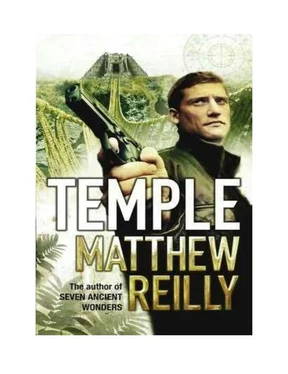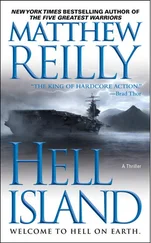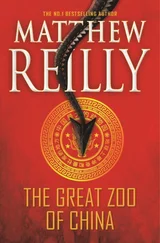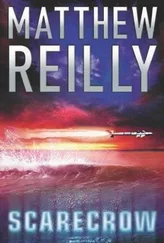Someone who didn’t belong.
He saw his bodyguard—the tall sergeant, Van Lewen—hovering at the perimeter of the circle, and he smiled. ‘Hey.’
Van Lewen smiled back. ‘How’s it going?’
‘Good. Really good,’ Race said lamely.
He walked past the now silent band of rugged Green Berets, reached the steep flight of steps that led back up to the main passenger deck.
As he climbed the stairs, however, he heard the Green Beret named Cochrane mutter something from the cargo bay.
He knew he wasn’t supposed to have heard it, but he heard it anyway.
Cochrane had said, ‘Fucking pansy.’
A voice came over the PA system as Race walked back down the centre aisle of the passenger compartment. ‘Commencing our descent now. ETA Cuzco, twenty minutes.’
On his way to his seat, Race passed Walter Chambers.
The bespectacled little scientist was holding Race’s notes alongside another sheet of paper. It was a map of some sort, marked with a felt-tip pen.
Bolognesi (Iparia }
MOUNTAINOUS REGION
Chambers looked up at Race.
‘Ah, Professor,’ he said. ‘Just the man I was looking for. A point of clarification. These notes here, “Paxu, Tupra and Roya’, he pointed to Race’s notes. ‘These are in order, aren’t they? I mean, in the order Renco visited them.’
‘They’re in the same order as they appear in the manuscript.’
‘Okay, good.’
‘Hey, Walter,’ Race said, sitting down next to Chambers.
“There was something I was hoping I could ask you.’
‘Yes?’
‘In the manuscript, Renco mentions a creature called the titi or the rapa. What exactly is that?’
‘Ah, the rapa; Chambers nodded. ‘Hmmm, yes, yes. Not really my field, but I do know a little bit about it.’
‘And?’
‘Like many other South American cultures, the Incans had an unusual fascination with the great cats. They built statues to them, both large and small, and sometimes they carved huge has reliefs of them into entire mountain rockfaces. Why, the city of Cuzco was even built in the shape of a puma.
‘This fascination with the great cats, however, is really quite a strange phenomenon, since South America is known for its lack of great cats.
The only large cats indigenous to the continent are the jaguar—or panther—and the puma, which are actually only medium-sized felines.
They’re not even close in size to the tiger which is the largest of all the great cats.’
Chambers shifted in his seat. ‘The rapa, however, is another story altogether. It’s more like the South American version of Bigfoot or the Loch Ness monster. It’s a legendary creature, a great big black cat.
‘As with Bigfoot and Nessie, you hear of sightings every couple of years—farmers in Brazil complain about cattle mutilations; tourists on the Inca Trail in Peru claim to see big cats running around at night; and occasionally, local men are found brutally killed in the lowlands of Colombia. But no-one ever gets proof. There are a couple of photos, but they’ve all been discredited—just blurry, out-of-focus shots that could be anything from an ordinary old panther to a spectacled bear.’
‘So it’s a myth,’ Race said. ‘A giant-cat myth.’
‘Don’t dismiss giant-cat myths so quickly, Professor Race,’
Chambers said. ‘They are quite common throughout the world. India.
South Africa. Siberia. Why, it might surprise you to learn that the most vehement beliefs in giant-cat myths come from England.’
‘England?’
‘The Beast of Exmoor, the Beast of Bahn. Giant cats that prowl the moors late at night. Never caught. Never photographed.
But their prints are often found in the mud.
Goodness, if the sightings are true, chances are that the Hound of the Baskervilles was not a dog, but actually a giant cat.’
Race snuffed a laugh at that and left Chambers to his work. He returned to his seat. No sooner had he sat down, however, than he felt someone sit down next to him. It was Lauren.
‘Ah, the lucky cap,’ she said, looking at Race’s battered blue Yankees cap. “I don’t know if I ever told you this, but I always hated that damned cap.’
‘You told me.’ Race said.
‘But you still wore it.’
“It’s a good cap.’
Lauren’s eyes wandered appraisingly over his T-shirt, jeans and Nikes.
Race noticed that she was dressed in a thick khaki shirt rolled up at the sleeves, khaki trousers and a sturdy-looking pair of hiking boots.
‘Nice outfit,’ she said, before he could say exactly the same thing.
‘What can I say?’ he replied. ‘When I packed for work today I wasn’t expecting to go to the jungle.’
Lauren threw her head back and laughed. It was the same laugh Race remembered from the old days. Totally theatrical and of utterly dubious sincerity.
‘I’d forgotten how dry you were,’ she said.
Race smiled weakly, bowed his head.
‘How have you been, Will?” she asked gently.
‘Good,’ he lied. ‘And you? You’ve obviously done well for yourself. I mean, geez, DARPA…’
‘Life is good,’ she said. ‘Life is very good. Listen, Will…“ And there it was. The transition. Lauren had always been good at getting down to business. ‘… I just wanted to talk with you before we landed. I just wanted to say that I don’t want what happened between us to get in the way of what we’re doing here. I never meant to hurt you—’
‘You didn’t hurt me,’ Race said, perhaps a little too quickly. He looked down at his shoelaces. ‘Well, nothing that didn’t mend after a while.’
Not exactly true.
It had taken him a lot more than a while to get over Lauren O’Connor.
Their relationship had been a classic sort of affair: the all-American college mismatch. Race was smart, but had no money. Lauren was brilliant, and her family had money to burn. Race went to USE on a half sports scholarship. In return for playing football for them, they paid half his tuition. He’d scraped together the other half by working nights behind the bar at a local nightclub. Lauren’s parents had paid all her fees in full, in one up-front payment.
They were together for two years. The footballer with decent but not spectacular grades in languages, and the tall, beautiful science major who was acing everything.
Race had loved it. Lauren was all he’d ever wanted in a companion—
intelligent, outgoing, acidly funny. At football parties, she’d stand out like the sun on a cloudy day. And when she’d search the room for him and find him and smile, he’d melt.
He fell in love with her.
And then Lauren won a scholarship to study at MIT for a year, doing theoretical physics or something like that. She went. He waited. Now it was the classic long-distance relationship.
Love over the phone. Race was faithful. He lived for their weekly phone call.
And then she came back.
He was at the airport, waiting for her. He had the ring in his pocket.
He’d practised the speech a thousand times, got it just right so that he’d drop to one knee at precisely the right moment and ask her.
But when she came through the Arrivals gate that day, she already had a diamond ring on her ring finger.
‘Will. I’m sorry,’ she’d said. ‘But… well… I’ve met someone else.’
Race never even got the ring out of his pocket.
And so he’d spent the rest of his time in college nose-down in the books, resolutely single and unimaginably miserable.
He’d graduated fourth in his class in ancient languages and, to his complete surprise, got an offer to teach at NYU.
With nothing else he wanted to do except maybe slashing his wrists—he took it.
And now, now he was a humble language professor working out of an old clapboard office in New York City while she was a theoretical physicist working at the cutting edge of the United States military’s most esteemed high-technology weapons department. Hmmm.
Читать дальше











